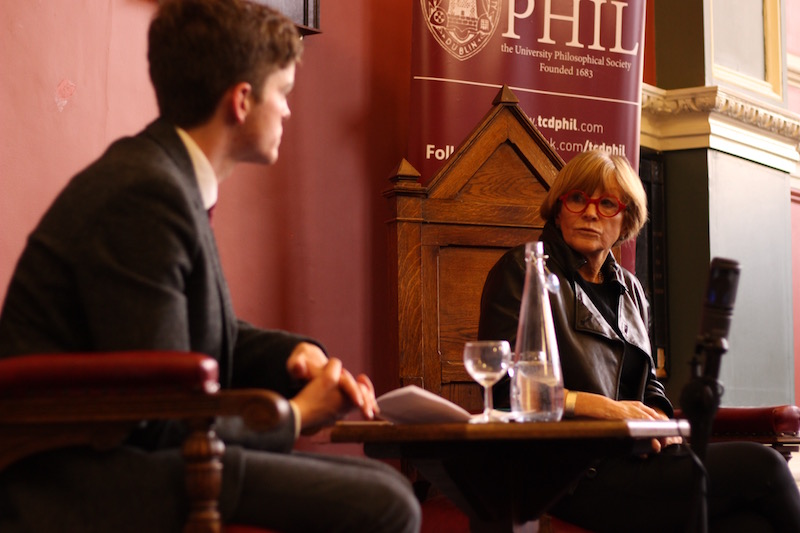
In 2005, Doctor Who imagined a version of The Weakest Link set in the 2001st century. The show was nearly identical to the one that ended in 2012: poorly lit with flashing blue lights and a semi-circle of podiums facing towards the host.
One difference, however, was that host Anne Robinson was replaced by the “Anne Droid”. And in this futuristic version, being the weakest link was considerably more fatal.
Yet the homage to The Weakest Link revealed something of the public attitude to Robinson herself. A pantomime villain who is loved, admired, and even feared for her steely demeanour.
Today, she appeared at the University Philosophical Society (the Phil) to receive its Gold Medal of Honorary Patronage. Dressed in all in black and wearing red glasses, she was just as imposing as her TV persona.
I was curious about the type of people who turn up to see Anne Robinson. Fans of daytime TV? Wannabe journalists? Those with a spare hour? From the questions asked, it was a combination of all three.
As the first woman to edit a national newspaper in Britain, as Assistant Editor of the Daily Mirror, she had strong words for all those considering a career in journalism. “I’d like to see quality of writing and truth back in journalism. And lack of clichés. And good grammar”. Duly noted.
Her first day as Assistant Editor came as the Falklands War was beginning. Things only got more difficult from there. Robinson encountered sexism aplenty in an era when female journalists were still rare. She had strong advice for all the women in the audience: “Just be brave, because the guys will try and put you down.”
“Never ever take a job that you can do, there is no point. Always take a job you can’t do, because then you’ll learn something”, she added.
This was something she experienced in Ireland, as a reporter in 1969. Covering the general election, she was shadowing politician, academic and historian Conor Cruise O’Brien – “reticent and modest” – and Charlie Haughey, who was then to go on to become Taoiseach.
Her experience with the latter captured something of how society has changed since then. “For three quarters of an hour he stroked my thigh”, she said, and tried to find “imaginary dust” on her chest.
In an era of where there was no equal pay for women and no such thing as maternity leave, she said she “didn’t know to be offended by that. I thought it was hilarious”.
Robinson is still working in journalism: “I am the oldest women on BBC prime time not baking cakes.”
Yet, inevitably, most of the questions revolved around the The Weakest Link. “I was very shallow, so I quite liked the idea of being famous”, she said, when asked why she first got into television.
If the show was to return with a new host, who’d be able to fill her shoes? Acknowledging that “you should never think you’re replaceable”, she raised some interesting names as possible hosts: Jeremy Clarkson, Michael O’Leary, Donald Trump and Nigel Farage. Haughey, she said, might also have been a good host.
Robinson saved much of her famed venom when speaking about politicians: “We have about three or four politicians in the UK who don’t talk to you as if your dog has just died.”
For about the millionth time this term, post-truth politics and social media came in for attack: “We’re all very keen on freedom of speech. But what we need to talk about is quality of speech.”
She admitted, however, she didn’t have a solution. “I don’t know how you regulate truth, without clipping the wings of freedom.”






